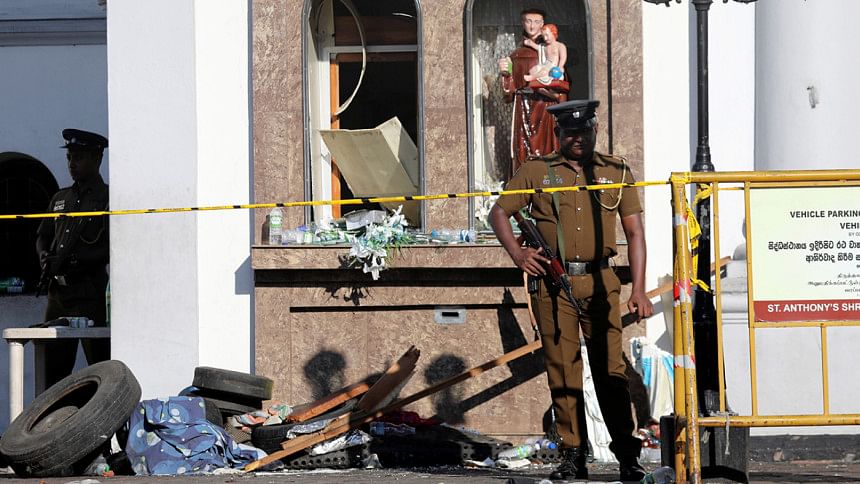Panic grips Sri Lanka

Sri Lankan authorities yesterday locked down the central bank and shut the road leading to the jittery capital’s airport because of a bomb scare as more people were swept up in the search for those behind Easter Sunday bombings.
Two bank officials told Reuters the street outside the building near the World Trade Centre in the capital, Colombo, was blocked to traffic before the security alert was lifted.
Underscoring the nervous atmosphere in the Indian Ocean nation, authorities also shut the entry road to Colombo’s main airport after a suspicious vehicle was spotted at a car park. The road was reopened when the alert was declared a false alarm.
Meanwhile, the Sri Lankan authorities yesterday lowered the death toll in the Easter bombings by more than 100 to 253, admitting some of the badly mutilated bodies had been erroneously double-counted.
Catholic church also suspended all public services over security fears yesterday, as thousands of troops joined the hunt for suspects.
A senior Catholic priest told AFP that all public services were being suspended “on the advice of security forces”. Private burials will still be carried out.
A police spokesman said there was an explosion in a town east of the capital but there were no casualties. The cause was not clear but it was not a controlled detonation like other blasts in recent days and was being investigated, he said.
With fears of more bombers ready to strike, police said they had asked people to leave offices early in Colombo’s business district to avoid throngs at rush hour. City-centre restaurants were also shutting early.
More people, including foreigners, were swept up for questioning overnight as domestic and international authorities investigated deeper into the bombings, believed to have been the deadliest such attack claimed by Islamic State.
About 500 people were also wounded in the attacks on three churches and four hotels.
Police said 16 people were detained for questioning overnight, taking the number held since Sunday to at least 76.
They include a Syrian national, detained after police got information about him from Sri Lankan suspects.
One of those detained overnight was linked to a terrorist organisation, police said, but gave no details. Another was taken into custody after “hate speech” was discovered on their Facebook page.
“It was related to the spreading and preaching of terrorism,” a police spokesman said.
Police later arrested three people and seized 21 locally made grenades and six swords during a raid in Colombo, a spokesman said. He did not give details or suggest that the raid was linked to the suicide bombings.
An Egyptian and several Pakistanis have also been detained in the broader crackdown but there was no suggestion they had any direct links to the attacks.
Defence Secretary Hemasiri Fernando told Reuters yesterday that he had resigned, taking responsibility for the suicide bomber attacks.
He said that while there had been no failure on his own part, he was taking responsibility for failures of some institutions he headed as the secretary of defence.
HOME-GROWN BOMBERS
However, authorities have also focused their investigations on international links to domestic Islamist groups - National Thawheed Jama’ut and Jammiyathul Millathu Ibrahim - they believed carried out the attacks.
A picture has emerged of a group of nine well-educated, home-grown Islamist suicide bombers, including a woman, who carried out the attacks in the South Asian nation.
Two of the bombers were brothers, sons of a wealthy spice trader and pillar of the business community, a source close to the family said.
Islamic State released a video on Tuesday that showed eight men, all but one with their faces covered, standing under a black Islamic State flag and declaring their loyalty to its leader, Abu Bakr Al-Baghdadi.
The government said there were nine suicide bombers, eight of whom had been identified, and one was a woman.
The man whose face could be seen in the video has been identified as Mohamed Zahran, a preacher from the east of Sri Lanka known for his militant views and Facebook posts who officials believe was the mastermind of the attack.
Australian Prime Minister Scott Morrison said another of the bombers had lived in Australia with his wife and child on a student visa but left in 2013.
Morrison did not identify the man, although his family have said his name was Abdul Latheef Mohamed Jameel.
PAKISTANIS FLEE
The bombings shattered the relative calm that has existed in Buddhist-majority Sri Lanka since a civil war against mostly Hindu, ethnic Tamil separatists ended 10 years ago, and raised fears of a return to sectarian violence.
Sri Lanka’s 22 million people include minority Christians, Muslims and Hindus. Until now, Christians had largely managed to avoid the worst of the island’s conflict and communal tensions.
President Maithripala Sirisena was set to meet representatives of different faiths yesterday to address concerns of a sectarian backlash.
Muslims have fled the Negombo region on Sri Lanka’s west coast since scores of worshippers were killed in the bombing of the St. Sebastian church there on Sunday. Communal tensions have since flared.
Hundreds of Pakistani Muslims have left the port city, crammed into buses, after threats of revenge.
“Because of the bomb blasts and explosions that have taken place here, the local Sri Lankan people have attacked our houses,” one of them, Adnan Ali, told Reuters on Wednesday as he prepared to board a bus.

 For all latest news, follow The Daily Star's Google News channel.
For all latest news, follow The Daily Star's Google News channel. 




Comments